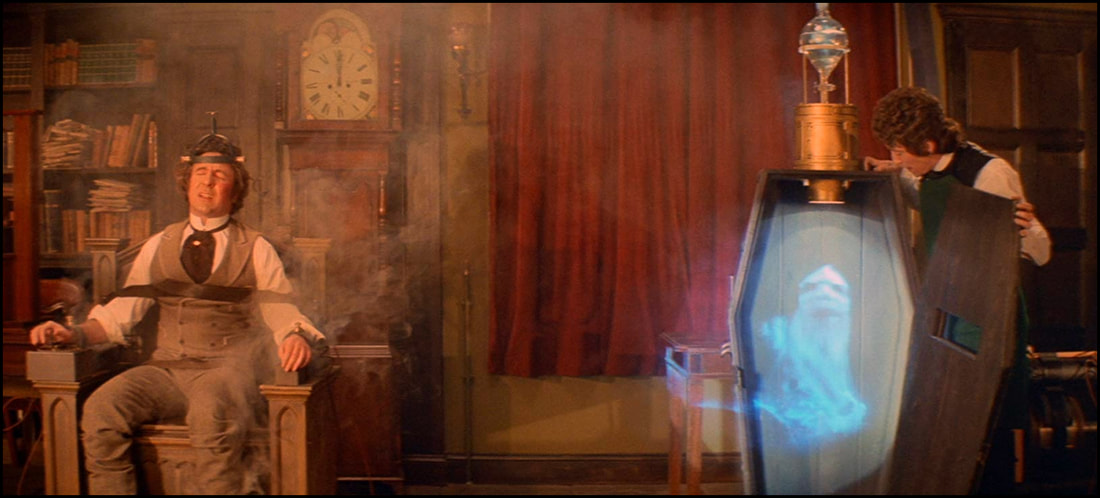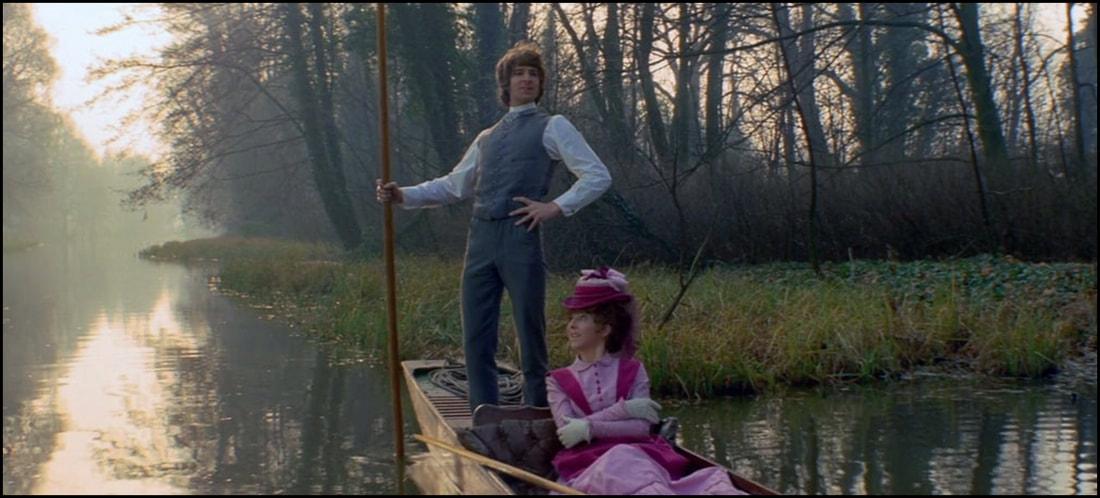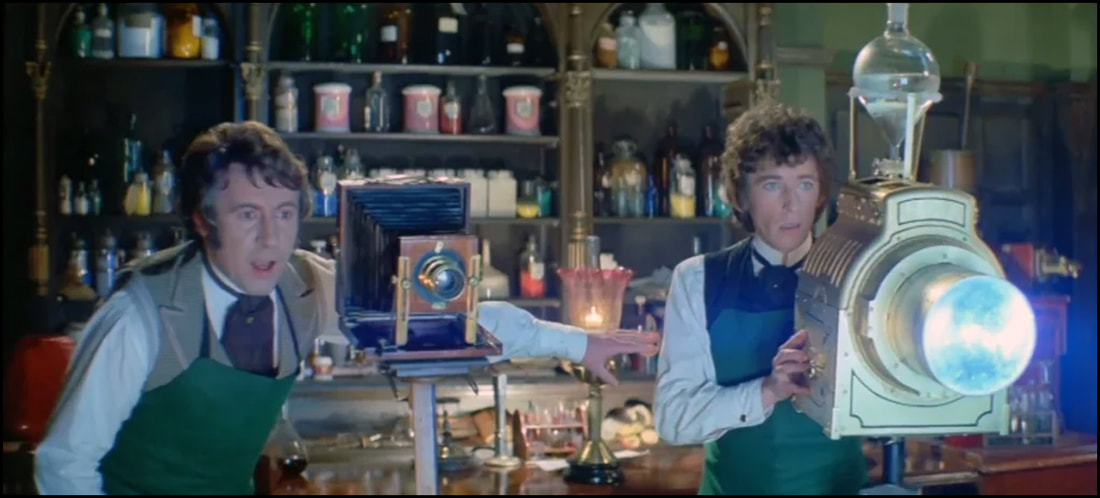This is a sentiment that pervades a vast number of Science Fiction and Fantasy films. Even Dr. Frankenstein found himself receiving an epiphany too late to perhaps do anything about it when he unleashed his monster on the unsuspecting villagers. Sometimes cheating death can be a bad thing, no? That’s the thing about hubris, I suppose: it blinds us to the real possibilities of destiny – of what very well might be waiting at the end of the rainbow (hint: it’s not a pot of gold) – and all we’re left with is a quick ending brought about by our very own lack of foresight. Yes, such a comeuppance isn’t restricted to only genre films – there are plenty of dramas, mysteries, and even conventional comedies that tinker with similar cause-and-effect scenarios – but it is only SciFi that typically blinds its cinematic geniuses to formulaic perfection, putting them on the road to ruin well before they’ve mustered the intuition to recognize the deadly path they’re on.
That’s pretty much the sum behind The Asphyx, an early 1970’s attempt to kinda/sorta blend steampunk with some English/Gothic Horror. Its pacing is slow, to say the least, and its performances are only occasionally inspired. Though it builds around an interesting premise – the fringe science to control one’s life – it really does very little with the concept, reducing it to the point of being a cliché within any otherwise curious experiment. So while it isn’t particular good, it also isn’t particular bad, leaving director Peter Newbrook possibly having a bit more in the script (from Christina Beers, Laurence Beers, and Brian Comport) than he knew precisely how to stage.
(NOTE: The following review will contain minor spoilers necessary solely for the discussion of plot and/or characters. If you’re the type of reader who prefers a review entirely spoiler-free, then I’d encourage you to skip down to the last few paragraphs for the final assessment. If, however, you’re accepting of a few modest hints at ‘things to come,’ then read on …)
“Utilizing an experimental photographic device, a scientist capture what appears to be the image of the Asphyx – the ancient Greek spirit of the dead. With the help of his adopted son, he conducts further experiments and conceives of a way to harness the Asphyx and thereby gain immortality. But, as every visionary scientist should know, defying the laws of the natural and spiritual world unleashes dreadful consequences …”
In the days of old in United States’ advertising, there once was a commercial for a particular brand of margarine that always ended with one singular line: “It’s not nice to fool Mother Nature.” The trick here was that it wasn’t margarine, but it tasted so much like it that buyers couldn’t tell the difference, so there was a price to pay when Mother Nature – a character in the ads – was duped. At the end of the bit, a kind of vengeful wrath would be unleashed – lightning, winds, rains, etc., but all to comic effect, of course – and audiences would be reminded of a valuable lesson that seemingly always escapes our supposed brightest minds.
Well … that’s the basic premise behind The Asphyx: be careful what you wish for because it’ll likely be a curse. Thus, Sir Hugo Cunningham (played by Robert Stephens) stumbles across the ‘science’ that opens the door to immortality, and not only does he wish to rush through but also he schemes to take all of his family with. Obviously, this desire only serves to be his undoing – much in the same way Mother Nature paid back those who dared to toy with margarine authenticity – but I don’t want to get ahead of myself …
Sadly, there is an awful lot of ground that gets covered before The Asphyx gets to its seminal set of circumstances, and that is the film’s great hubris as so very little of it is delivered with any sense of urgency.
Our lead is given a rather theatrical beginning, including introductions for friends and family as well as a new love interest – all of which take a bit of time in setting this particular tale in motion. The fact that Cunningham essentially stumbles into this specialty, though it is given a very weak foundation in the ‘spirit photography’ of a certain bygone era, slows the picture down a bit when perhaps some other modus operandi might’ve accomplished more with less. If the script had started with the man chasing these answers over the loss of a previous wife, then perhaps this film wouldn’t have felt so languid. However, the loss of the new fiancé and another untimely death that take place on screen in order to align the scientist’s personal interests with the narrative throughline. Why introduce two characters just to kill them moments later? We weren’t attached to them, so how are we to conclude that Cunningham was with so little screen time? In fact, once the Asphyx appears, the audience is finally given a welcome distraction once it finally rears its cosmological (or is that existential?) head as opposed to what is otherwise a bit too banal melodrama.
Ah, if the problems only started and stopped there!
When all is said and done, The Asphyx boils down to yet one more attempt by a series of characters to cheat death. That alone is a premise that has enjoyed a long life (gasp!) in Horror and Fantasy, and it’s even had a franchise all of its own not all that long ago: the Final Destination pictures toyed with its cast being chased down by the Grim Reaper when they survived some event that should’ve spelled their demise. As this version stands, it really seems as if it would’ve been a vastly improved one-off episode of The Twilight Zone or The Outer Limits instead of a full motion picture; a truncated cut that stuck centrally to the fancy bits would’ve at the very least kept an audience’s interest better than this one does with a measure of bloat.
The Asphyx (1972) was produced by Glendale Films. DVD distribution (for this particular release) is being coordinated by the fine folks at Kino Lorber. As for the technical specifications? Though I’m no trained video expert, I thought the sights and sounds of the theatrical version (86 minutes) were very good, though some might wonder if the special effects sequences even for their day were a bit substandard. Lastly, if you’re looking for special features, then there is an extended 99-minute cut of the picture that rather obviously blends HD with SD footage (of decidedly inferior quality); an audio commentary hosted by writers Kim Newman and Stephen Jones; and the theatrical trailer. It’s an interesting collection to consider, though I found the commentary track a bit uninteresting … which can happen from time to time.
Alas … only Mildly Recommended.
While not a particular good film, The Asphyx benefits to a small degree by not being particular bad, either. Its cinematography is quite good in a few places, and the sequences involving capturing these elusive creatures do have a good visceral thrill to them in a few spots. But so very much of the fate awaiting these characters is so obviously predictable that you’re never compelled to care about them very deeply if even at all … as they’re all inevitably destined for the trash heap of history or going to survive with some consequence worse than death.
In the interests of fairness, I’m pleased to disclose that the fine folks at Kino Lorber provided me with a complimentary Blu-ray of The Asphyx (1972) by request for the expressed purposes of completing this review; and their contribution to me in no way, shape, or form influenced my opinion of it.
-- EZ




 RSS Feed
RSS Feed